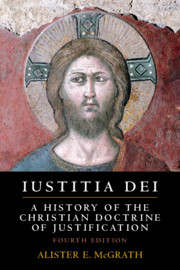Book contents
- Iustitia Dei
- Iustitia Dei
- Copyright page
- Contents
- Tables
- Preface to the Fourth Edition
- Abbreviations
- Introduction
- Part I Justification
- Part II The Middle Ages
- Part III Protestantism
- Part IV Catholicism
- 20 Developments within Catholicism, 1490–1545
- 21 Catholic Responses to Early Protestant Doctrines of Justification
- 22 An Attempt at Rapprochement
- 23 Catholic Theological Schools during the Tridentine Debates on Justification
- 24 The Tridentine Debates on Justification
- 25 The Tridentine Decree on Justification
- 26 Post-Tridentine Discussions of Justification
- Part V The Modern Period
- Conclusion
- A Brief Glossary of Medieval Soteriological Terms
- Works Consulted
- Index
21 - Catholic Responses to Early Protestant Doctrines of Justification
from Part IV - Catholicism
Published online by Cambridge University Press: 27 January 2020
- Iustitia Dei
- Iustitia Dei
- Copyright page
- Contents
- Tables
- Preface to the Fourth Edition
- Abbreviations
- Introduction
- Part I Justification
- Part II The Middle Ages
- Part III Protestantism
- Part IV Catholicism
- 20 Developments within Catholicism, 1490–1545
- 21 Catholic Responses to Early Protestant Doctrines of Justification
- 22 An Attempt at Rapprochement
- 23 Catholic Theological Schools during the Tridentine Debates on Justification
- 24 The Tridentine Debates on Justification
- 25 The Tridentine Decree on Justification
- 26 Post-Tridentine Discussions of Justification
- Part V The Modern Period
- Conclusion
- A Brief Glossary of Medieval Soteriological Terms
- Works Consulted
- Index
Summary
Chapter 21 considers early Catholic responses to Luther, noting an apparent lack of understanding of the core themes of Luther’s reforming programme. There was a tendency to focus on the ecclesiological implications of Luther’s protests, rather than to identify the core theological concerns which lay behind then. There were, of course, important exceptions. The English Catholic theologian John Fisher defended the bull Exsurge Domine by focussing on the three broad themes which he believed to lie at the core of Luther’s theology: the denial of papal primacy, justification by faith alone, and the restriction of doctrinal authority to scripture alone. This brief survey of early Catholic responses to Luther suggests that his theology of justification was generally not understood, nor were its wider implications appreciated, in the opening phase of the Reformation. This observation suggests that Catholicism’s delayed capacity to grasp the nature and implications of Luther’s theology of justification blunted its capacity to understand the appeal of this way of thinking to people who were looking for a more accessible and personally engaged account of the Christian faith.
- Type
- Chapter
- Information
- Iustitia DeiA History of the Christian Doctrine of Justification, pp. 287 - 292Publisher: Cambridge University PressPrint publication year: 2020

